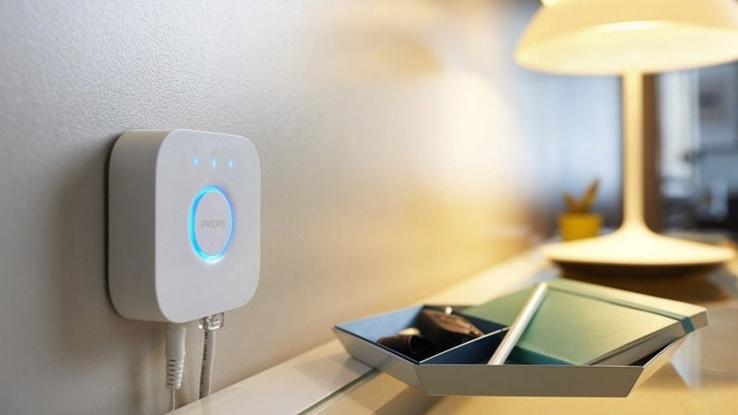Philips Hue smart bulbs allow for a customized and voice-activated smart home setup. But they will also go back to their original color and brightness after you lose power.
You can fix that with the Power-On Behavior feature, which gives you two options for when your lights regain power. They can go back to the Philips Hue default—which is a warm, white color at full brightness—or the last color and brightness level you chose. The latter is a lot less jarring, especially if you lose power in the middle of the night. No one wants to be woken up by a bright light in their face.
Here's how to find and tweak the Power-On Behavior setting.
Update Your Lights, If You Haven't Already
The Power-On Behavior feature was added in December 2018 and requires a firmware update on all your bulbs. If you don't have automatic updates enabled, or if it hasn't rolled out to your devices just yet, you'll need to update them. Inside the Philips Hue app on your phone, tap the Settings section, tap Software Update, and check for updates.Make Sure Your Lights Are Compatible
Even if you update your app, it doesn't necessarily mean you will be able to use this feature. Power-On Behavior only works with Hue Bulbs (E26/E27/E12/E14/BR30/GU10), Hue Lightstrips, and Hue Lamps. You will also need the second-generation Philips Hue Bridge (BSB002), which is the square model, as opposed to the round one. If you're using the older Bridge model or any other lighting product, you won't be able to make these changes.

Unsure if one of your bulbs is compatible? The update section in the Hue app (Settings > Software update) is a good place to find the specific model number for each of your bulbs, and can save you a lot of time and frustration.
Change Each Bulb's Power-On Behavior
Navigate to Settings > Power-On Behavior to view a list of your connected light bulbs. Tap one and choose which power-on behavior you prefer—whether you want the bulb to revert back to default settings or maintain your preferred settings. Repeat this process for every bulb and light you want to change.
If one of your lights isn't supported, you'll see an orange "Not supported" label underneath the bulb's name.
Test Your Lights
The Power-On Behavior feature is most useful when you lose power, but you can test it by hitting your light switch and turning your lights on and off. If they go back to their previous state, then it's clearly working.
Notably, this also means you have a little more flexibility when using your light switches. Typically, you have to leave your switches on if you want to control your smart lights with voice commands or your phone. However, now if you accidentally flip a switch, the lights will at least return to your preferred setting the next time you turn them on.
The Best Smart Home Devices
Whether you're looking for a connected light bulb, security camera, or thermostat, start with the best smart home devices we've tested for every room in the house.Sign up for Tips & Tricks newsletter for expert advice to get the most out of your technology.
EmailThis newsletter may contain advertising, deals, or affiliate links. Subscribing to a newsletter indicates your consent to our Terms of Use and Privacy Policy. You may unsubscribe from the newsletters at any time.
Thanks for signing up!Your subscription has been confirmed. Keep an eye on your inbox!









